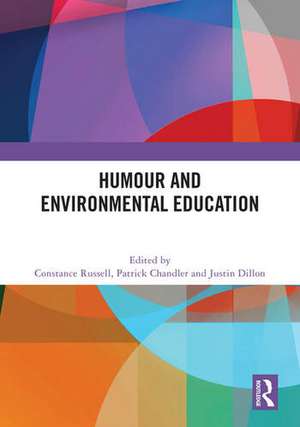Humour and Environmental Education
Editat de Constance Russell, Patrick Chandler, Justin Dillonen Limba Engleză Hardback – 23 dec 2024
The chapters adopt an array of methodological approaches and theoretical frames, drawing not only on environmental education research and humour studies, but also scholarship in affect theory, anti-racist and Indigenous education, climate change communication, critical pedagogy, ecocriticism and language arts education, feminist theory, human-animal relations, media studies, new materialisms, philosophy, psychology, public pedagogy, science education, and social movement studies. Many of the topics discussed in this volume necessitated multi- or interdisciplinary inquiries and pedagogies.
Delving into humour led the authors to push beyond the boundaries of their own disciplines and, for some, to form creative collaborations that took them not only into new academic fields but also outside their professions to work with actors, cartoonists, comedians, and game developers. This book was originally published as a special issue of Environmental Education Research.
Preț: 935.68 lei
Preț vechi: 1028.21 lei
-9% Nou
Puncte Express: 1404
Preț estimativ în valută:
179.04€ • 187.41$ • 149.02£
179.04€ • 187.41$ • 149.02£
Carte tipărită la comandă
Livrare economică 31 martie-14 aprilie
Preluare comenzi: 021 569.72.76
Specificații
ISBN-13: 9781032948737
ISBN-10: 1032948736
Pagini: 166
Dimensiuni: 174 x 246 mm
Greutate: 0.53 kg
Ediția:1
Editura: Taylor & Francis
Colecția Routledge
Locul publicării:Oxford, United Kingdom
ISBN-10: 1032948736
Pagini: 166
Dimensiuni: 174 x 246 mm
Greutate: 0.53 kg
Ediția:1
Editura: Taylor & Francis
Colecția Routledge
Locul publicării:Oxford, United Kingdom
Public țintă
Postgraduate, Undergraduate Advanced, and Undergraduate CoreCuprins
Introduction: Humour and environmental education 1. The generativity of feminist and environmental cartoons for environmental education research and teaching 2. Learning with student climate strikers’ humour: Towards critical affective climate justice literacies 3. “It was funny at first”: Exploring tensions in human-animal relations through internet memes with university students 4. When students write comedy scripts: Humor as an experiential learning method in environmental education 5. Is climate change a laughing matter? 6. From The Fresh Prince to The Politician: Climate change frames in American scripted television comedy 1990–2020 7. The cranky uncle game: Combining humor and gamification to build student resilience against climate misinformation 8. Humor and humility for inclusive nature education 9. I am not a camper: Confessions of an Indigenous urban environmental educator 10. “A good hell”: Absurdist insights for environmental education and research 11. Irony and environmental education: On the ultimate question of environmental education, the universe and everything
Notă biografică
Constance Russell is Professor in the Faculty of Education, Lakehead University, Canada where she teaches courses in environmental education, animal-focused education, and food education. She was given the 2017 Outstanding Contributions to Research in Environmental Education award by the North American Association for Environmental Education.
Patrick Chandler is an education specialist for the Climate Literacy Energy Awareness Network (CLEAN) and the Cooperative Institute for Environmental Sciences (CIRES). He has over fifteen years of experience working in, developing, and researching environmental education, art, stewardship, and science programs and is an expert on climate change and plastic pollution education.
Justin Dillon is Professor of science and environmental education in UCL’s Centre for Climate Change and Sustainability Education. He taught in London schools for 10 years before working at King’s College London, the University of Bristol and the University of Exeter. Justin was President of the European Science Education Research Association from 2007-11.
Patrick Chandler is an education specialist for the Climate Literacy Energy Awareness Network (CLEAN) and the Cooperative Institute for Environmental Sciences (CIRES). He has over fifteen years of experience working in, developing, and researching environmental education, art, stewardship, and science programs and is an expert on climate change and plastic pollution education.
Justin Dillon is Professor of science and environmental education in UCL’s Centre for Climate Change and Sustainability Education. He taught in London schools for 10 years before working at King’s College London, the University of Bristol and the University of Exeter. Justin was President of the European Science Education Research Association from 2007-11.
Descriere
This book illustrates how humour can be a powerful tool for environmental education. Hailing from eight different countries, the authors’ inquiries are grounded in a range of sites of learning and focus on different comedic forms, offering a variety of perspectives on the ways humour features, or could feature, in environmental education.
